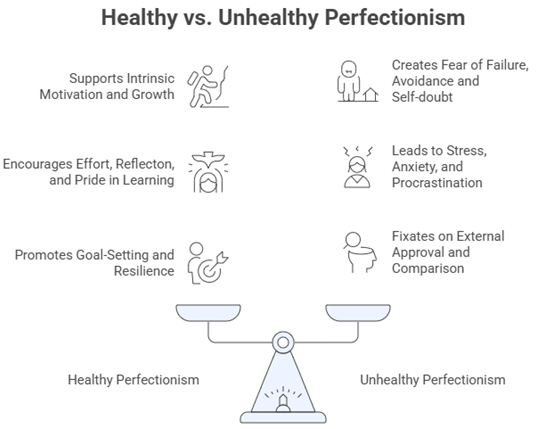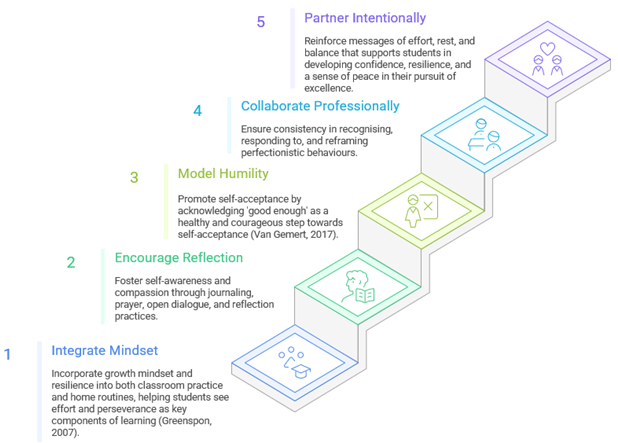Perfectionism in High Potential and Gifted Learners
In the Catholic Schools of Maitland-Newcastle, we strive to nurture the whole child – intellectually, spiritually, emotionally, and socially. Among our high potential and gifted learners, perfectionism often emerges as both a strength and a challenge. Understanding and responding to this characteristic is vital to ensuring that each learner flourishes within an environment of faith, growth, and belonging.
Understanding Perfectionism
Perfectionism is common among gifted learners who hold themselves to extraordinarily high standards (Adelson & Wilson, 2009). Many of our students experience early success in their learning journeys, often achieving high results with minimal effort. Over time, these experiences can reinforce the belief that excellence is the only acceptable outcome.
While diligence and commitment to high standards are admirable, unrealistic self-imposed expectations can become emotionally and academically draining. Within our diocesan context, teachers and parents frequently observe perfectionism manifesting through frustration, avoidance, self-criticism, or withdrawal from learning opportunities – particularly when students perceive they may not “get it right” (Greenspon, 2007).
Healthy vs. Unhealthy Perfectionism
Perfectionism is not inherently negative. In fact, when balanced, it can be a source of motivation and perseverance (Van Gemert, 2017). Our goal as educators and parents is to help students move from unhealthy to healthy perfectionism – recognising that mistakes are essential for learning and that worth is not determined by grades or flawless outcomes (Adelson, 2007).
Profiles of Perfectionism and Strategies for Support
Gifted learners may demonstrate perfectionism in different ways. Recognising these profiles can help teachers and parents respond with understanding and practical strategies (Adelson & Wilson, 2009).
- The Acedemic Achiever
- Traits: Strives for perfect grades; equates marks with self-worth.
- In Practice: May perceive an 89 % as a failure or become upset with constructive feedback.
- Strategies:
- Shift focus from marks to growth and effort.
- Celebrate persistence and improvement, not perfection.
- Encourage reflection before results are shared.
- The Accuracy Assessor
- Traits: Spends excessive time refining work and fears making mistakes.
- In Practice: Homework or projects take far longer than expected; may lose sleep or withdraw socially.
- Strategies:
- Model imperfection – share personal mistakes and what was learned from them (Van Gemert, 2017).
- Use examples of resilient role models, including Saints or faith-based figures who learned through challenge.
- Set time limits for tasks and praise completion.
- The Risk Evader
- Traits: Avoids challenges that might expose vulnerability or failure.
- In Practice: May refuse to attempt difficult tasks or avoid answering in class.
- Strategies:
- Create safe spaces to take academic risks.
- Praise curiosity and attempts rather than outcomes.
- Incorporate growth-mindset language into class discussions (Greenspon, 2007).
- Set time limits for tasks and praise completion.
- The Image Manager
- Traits: Focused on maintaining an appearance of
success and competence. - In Practice: May quit when losing a game or struggle
with teamwork. - Strategies:
- Model humility and good sportsmanship.
- Reinforce that effort and integrity matter more than appearances.
- Emphasise service and collaboration over competition (Adelson, 2007).
- Traits: Focused on maintaining an appearance of
- The Procrastinating Perfectionist
- Traits: Delays starting tasks for fear of not meeting expectations.
- In Practice: Produces rushed work or avoids completion altogether.
- Strategies:
- Help break tasks into smaller, manageable steps.
- Establish timelines and celebrate progress.
- Encourage self-compassion and reflection on effort (Adelson & Wilson, 2009).
Promoting a Healthy Mindset – A Collective Approach
As a system, we recognise that nurturing high potential and gifted learners requires a shared commitment between schools, families, and the wider community. Together, we can create environments where excellence and wellbeing are equally valued, and where young people learn that growth often comes through challenge and imperfection.
As educators and parents, we can collectively:
When to Seek Further Support
If perfectionistic behaviours lead to anxiety, distress, or avoidance that impacts daily life, professional assistance may be required. Students and parents are encouraged to consult with the school’s Gifted Education Mentor, Student Support Team or Wellbeing Coordinator, who can refer to appropriate diocesan services or mental health professionals (National Association for Gifted Children [NAGC], 2017).
In Closing
In the Catholic Schools of Maitland-Newcastle, we recognise that perfectionism often stems from a deep desire to do well, to please others, and to live up to one’s potential – values that align with our shared mission of striving for excellence in all things. Yet true excellence is found not in flawlessness, but in courage, persistence, and grace.
Helping our high potential and gifted students embrace imperfection is, in many ways, helping them embrace their humanity – and their God-given potential (Adelson & Wilson, 2009; Greenspon, 2007).
References
- Adelson, J. L. (2007). A “perfect” case study: Perfectionism in academically talented fourth graders. Gifted Child Today, 30(1), 14–20.
- Adelson, J. L., & Wilson, H. E. (2009). Letting go of perfect: Overcoming perfectionism in kids. Prufrock Press.
- Greenspon, T. S. (2007). What to do when good enough isn’t good enough: The real deal on perfectionism: A guide for kids. Free Spirit Publishing.
- Van Gemert, L. (2017). Perfectionism: A practical guide to managing “never good enough.” Great Potential Press.
- National Association for Gifted Children. (2017). Perfectionism [Tip sheet]. https://www.nagc.org



